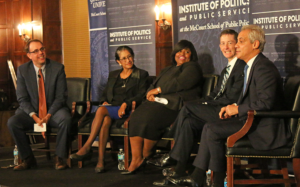
Interim Dean of the McCourt School of Public Policy Michael Bailey, left, moderated a discussion among former White House deputy chief of staff Maria Echaveste, former director of White House political affairs Minyon Moore and former Clinton advisers Bruce Reed and Chicago Mayor Rahm Emanuel.
A return to a less polarized political climate should follow the example set by the bipartisan style of former President Bill Clinton (SFS ’68), argued top Clinton White House advisers at a “Clinton 25: Georgetown Reflects on the Vision of Bill Clinton” panel in Copley Formal Lounge on Monday.
Chicago Mayor Rahm Emanuel (D), formerly a senior adviser for Clinton, said his one-time boss redefined the political dichotomy: Instead of focusing on party divisions, he said, Clinton focused on progress.
“It wasn’t that he was a centrist; he reframed the debate about whether we were going forward or back,” Emanuel said.
Minyon Moore, director of White House political affairs for Clinton, said all presidents can use their bully pulpit to unite the country. According to Moore, President Donald Trump has instead used his influence as president to contribute to a polarized political climate.
“It starts at the top; it starts with the president. It is called a bully pulpit for a reason, because you can use that bully pulpit not to be a bully, but to raise the tone of this country, to bring us together,” Moore said. “The White House is the most audacious place you can work, and to lower it or to raise it is a choice, and it starts with the man in charge, or the woman in charge.”
The “Vision of America” panel was part of the “Clinton 25” symposium, hosted by the Georgetown University Institute of Politics and Public Service, celebrating the 25th anniversary of Clinton’s election. It preceded a keynote address by Clinton on Monday afternoon.
The panel included senior White House officials who reflected on the domestic agenda Clinton envisioned during his presidency. Speakers included Emanuel and Moore, as well as Bruce Reed, chief domestic policy adviser for Clinton, and Maria Echaveste, Clinton’s deputy White House chief of staff.
Interim Dean of the McCourt School of Public Policy Michael Bailey moderated the event.
Reed said hostility, which dominates Washington, D.C.’s current political environment, does not reflect the American people’s wishes. Though politicians in the District are divided, Reed said, the United States is not necessarily a divided country.
“What Clinton was able to do was show people in the suburbs and people in the city that they had the same concerns,” Reed said. “They were worried about quality of schools; they were worried about crime; they were worried about lack of opportunity and people not carrying their part of the load. And when you speak to people like that, then these partisan labels don’t matter as much.”
Individuals must take responsibility to transcend partisan barriers, Emanuel said.
“It’s also not just incumbent on elected leaders to do it. It’s incumbent upon other people, called citizens, to get engaged and listen to other people,” Emanuel said.
The panelists suggested obligatory public service, such as military service, could be used as a means to unite a polarized United States by encouraging diverse interaction. Mandating five months of national service could unify the American public, according to Emanuel.
“If you do believe, which I don’t, that we’re coming apart, but let’s accept that as a premise … you then need a defining experience and place where people together from all walks of life can serve a higher thing called America,” Emanuel said. “The most important thing we can do as a country, which Democrats and Republicans agree on, people in cities, suburbs, rural America agree on, is serving a place we want our children to inherit.”
In agreement with Emanuel, Echaveste said forms of service could empower more Americans to feel united.
“National service — where all of us had to serve in one way or another — would bring us together, because we would see each other as Americans, and not as these boxes,” Echaveste said.
Echaveste advocated for youth to get more involved in political processes more frequently.
“Jump in, take a chance, and find something you believe in,” Echaveste said. “Citizenship needs to be active, and not just on election day, but year-round.”
Reed said the combination of a long-term vision and capacity to execute constitutes a successful leader.
“My view of leadership is you have to be idealistic enough and principled enough to know why you’re doing what you’re doing, and ruthless enough to want to get it done,” Reed said. “If you look at successful presidents — Clinton, Lyndon Johnson, Lincoln, Roosevelt — they had both qualities.”




















